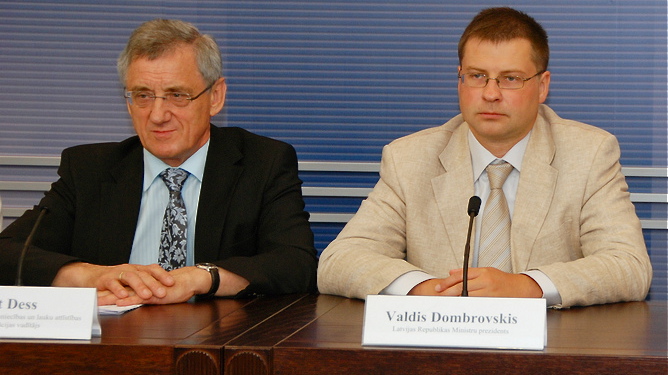
Latvian Prime Minister Valdis Dombrovskis (right) and EU officials give a press conference on Monday. A European Commission delegation was in Riga for much of last week. Photo by the Latvian State Chancellery.
RIGA — On Tuesday the European Union agreed to give Latvia its next €200 million loan tranche, to be disbursed in September.
Latvia’s previous government made the deal with the international lenders on a €7.5 billion bailout loan for the country in 2008. Very tough austerity measures were forced upon the country as part of the conditions for the loan.
The government had to agree to more cuts to the budget and consolidation to the tune of 395–440 million lats (€564-629 million) in order to reach the prescribed target of a budget deficit of 8.5 percent of the country’s gross domestic product.
European Commissioner for Economic and Monetary Affairs Olli Rehn praised Latvia for implementing the necessary fiscal consolidation measures initially agreed upon for the loan, something other bailed-out European countries like Hungary are struggling with.
“Financial conditions have largely stabilized and the economic situation is showing signs of improvement. Latvia is increasingly being hailed for the necessary decisions and measures taken to streamline public finances and improve competitiveness,” Rehn said in a statement to the press. “However, the budget deficit is still very high and the debt level is increasing rapidly, thus calling for significant consolidation in 2011. The authorities have committed themselves to taking socially-just net measures in the range of 395-440 million lats (€557-€620 million) to bring the deficit to below 6 percent of gross domestic product.”
Meanwhile the International Monetary Fund is meeting with the Latvian government on Wednesday to discuss the disbursal of its next tranche.
The Latvian government acknowledged that further financial consolidation measures will be difficult, but expressed determination to reduce the national deficit as agreed.
“Implementation of fiscal policy is aimed at budget deficit reduction to ensure fastest possible recovery of the economy and improvement of competitiveness in international markets. Despite the already reached achievements we have to continue targeted work to reduce excessive state budget deficit,” Minister of Finance Einars Repše said in a statement to the press.
— Baltic Reports reporter Adam Mullett contributed to this article.
This article is free to view. To read Baltic Reports’ subscription-only articles, click here.












